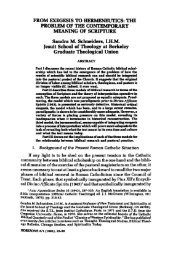WIFE AND SISTER THROUGH THE AGES - Blessed Edmund Rice ...
WIFE AND SISTER THROUGH THE AGES - Blessed Edmund Rice ...
WIFE AND SISTER THROUGH THE AGES - Blessed Edmund Rice ...
Create successful ePaper yourself
Turn your PDF publications into a flip-book with our unique Google optimized e-Paper software.
112 SEMEIAspeaks of the gifts Abram took with him when he left Egypt. Instead,Augustine focuses on the threat to Abram's life. By taking that threat veryseriously, Augustine begins to justify in extremis actions that would not beacceptable under ordinary circumstances. Then comes the tour de force.Abram's exposure of his wife is an act of faith. Abram trusted that Godwould protect her from harm; only so could he leave her unprotected. Farfrom being an act of cowardice, Abram's surrender of his wife was asupreme act of confidence in God's protection (Augustine, 1909: 286).This suggestion may solve the immediate problem of providinghonorable motives for Abram's actions, but it seems to invite a further,fatal riposte. If Abram trusted God to protect Sarai, why did he notequally trust God to deliver his own life? Again, Augustine proposed aprofoundly pious explanation. Abram did not wish to put God to the test.Since Abram had at his disposal means to preserve his own life withoutGod's assistance (the ploy with Sarai), not to avail himself of those meanswas to test God's faithfulness. This the pious Abram refused to do.With the major charge of greed and avarice answered by presentingAbram's true motives, Augustine can discharge the minor allegations.Abram technically never lied to the Pharaoh. He never claimed Sarai wasnot his wife because he was not asked. Here Augustine reads very closely.And, as for the claim that Sarai was his sister, well, she was. Or perhapsAbram spoke metaphorically. Biblical examples of such usage areadduced. Cleared of all charges.Several points merit reflection in this interchange between Augustineand Faustus. First, both Augustine and Faustus must operate with thesame fundamental reading conventions in order for meaningful discussionto take place. Shared reading conventions are the grounds of commondiscussion of the text. An unusual feature of this polemical circumstanceis that a preliminary negotiation takes place between Faustus andAugustine over what those conventions should be. Is the text to be readrealistically, as window on event, or as authorial artifact, with emphasison authorial intent? The choice has polemical implications, as we saw, butwhen Augustine declined to accept the author as the focus of discussion,both he and Faustus de facto accepted realistic convention as the commonground for discussion. Were one debater to convince the other, it wouldin this case be because he had presented a more credible realistic explanationof the characters' actions in this concrete situation.Secondly, on those grounds of credibility it is necessary to concede thepalm to Faustus. Greed and avarice are more plausible realistic explanationsof Abram's actions than Augustine's convoluted invocation ofAbram's piety. But somehow the inherent implausibility of the motivesAugustine supplies does not seem to matter. Augustine is not really



